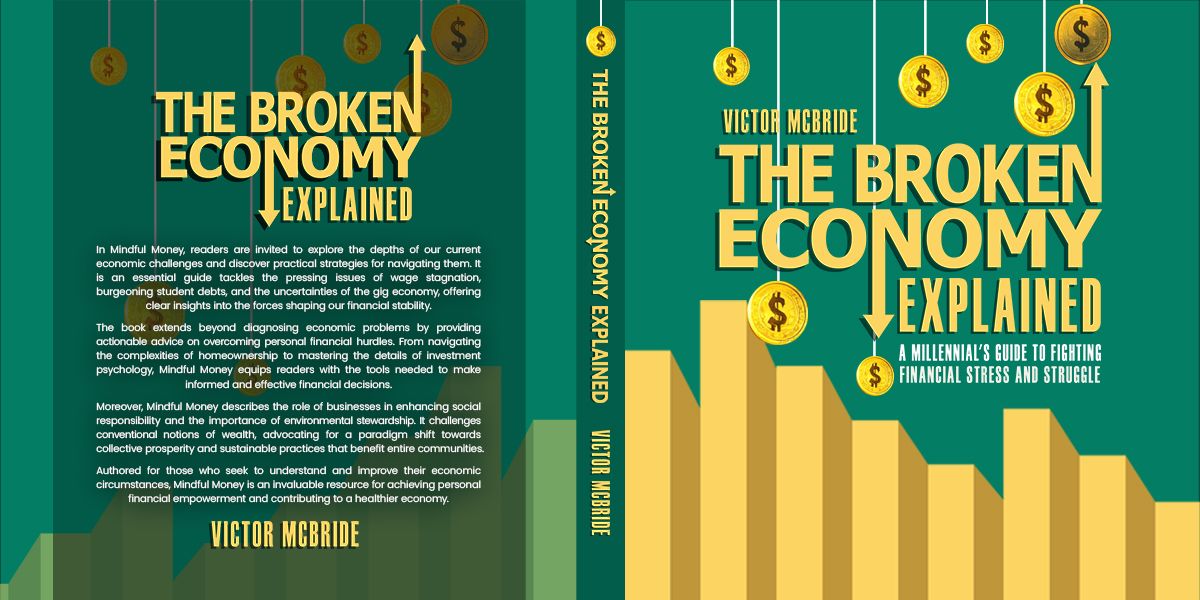Millennials were told the path to success was simple go to college, work hard, buy a house, and save for retirement. But that promise has been broken.
In The Broken Economy Explained: A Millennial’s Guide to Fighting Financial Stress and Struggle, author Victor McBride boldly and unflinchingly examines why millions of Americans are struggling—despite doing “everything right.”
His book is a wake-up call for a generation overwhelmed by rising costs, stagnant wages, and outdated advice.
With a clear and empathetic voice, McBride pulls back the curtain on a system that has left many spinning their wheels. Millennials are trying to build wealth in an economy where the rules have quietly changed.
Crushing Debt, Unstable Work, and Skyrocketing Costs
One of the book’s most gripping early chapters concerns student loans, which McBride describes as “a burden handed out with every diploma.”
Graduates enter the workforce with tens of thousands of dollars in debt. And what do they find? An economy that no longer ensures stable jobs.
The traditional job market is disappearing, replaced by a gig economy. This new world offers flexibility but lacks security.
Many millennials now juggle freelance work, contract roles, or low-paying jobs. Health insurance and retirement benefits are often out of reach. McBride argues that this new reality is not just inconvenient; it’s unsustainable.
He also addresses the housing crisis. In many major cities, rent eats up half—or more—of a young adult’s income. Buying a home, once the cornerstone of financial security, feels impossible. McBride doesn’t rely on statistics alone. He shares stories of people delaying family plans, skipping medical care, or working second jobs just to make rent.
The Emotional Toll of Financial Stress
What sets McBride’s book apart is how openly it discusses the emotional weight of money stress. This isn’t just about numbers; it’s about identity, dignity, and peace of mind.
Millennials aren’t just broke. Many are burnt out.
McBride explores the shame people feel over money—even when the problems aren’t their fault. He describes the exhaustion of living paycheck to paycheck, the embarrassment of asking parents for help, and the dread of opening a credit card bill. These are invisible wounds that leave lasting scars.
The book doesn’t just analyze these struggles—it validates them. McBride shifts the blame from individuals to the broken systems around them, aiming to start an honest, compassionate conversation.
Clarity and Strategy in a Complex World
McBride doesn’t only highlight the problems. He provides tools to manage them.
This isn’t a “get rich quick” guide. There are no shortcuts or empty promises. Instead, McBride emphasizes clarity, discipline, and long-term habits. He teaches readers how to manage debt, build emergency savings, adjust spending, and use income with intention.
But he’s careful to make one thing clear: personal effort isn’t enough. People need to do what they can. But they also need to understand the larger picture. The system is failing. His message is firm: You’re not the problem. The economy is.
The Case for Systemic Change
McBride doesn’t stop at personal finance. He makes a strong case for systemic reform. He calls for student loan forgiveness.
He supports affordable housing, universal healthcare, and labor protections for gig workers. These aren’t political talking points. They are practical, urgent responses to real problems.
The book challenges readers to imagine a better world in which financial security isn’t a rare privilege but a basic right.
A Voice of Empathy and Empowerment
Victor McBride’s greatest strength is how he blends realism with compassion.
He acknowledges that times are hard, and he doesn’t sugarcoat the challenges. But he also believes in the power of understanding.
When people see the truth clearly, they can take action. His tone is warm and grounded. He doesn’t lecture; he walks beside the reader.
For millennials feeling disillusioned or discouraged, this book is more than advice. It’s a lifeline.
Final Thoughts
The Broken Economy Explained isn’t just a financial book. It’s a generational reckoning.
It helps readers understand why so many hardworking, educated people are still falling behind. It speaks to the confusion, frustration, and quiet despair that often go unspoken. And most importantly, it offers a path forward.
Victor McBride’s message is powerful. You are not alone. You are not irresponsible. You are living in a broken economy. Now that you understand it, you can start to fight back—with knowledge, with purpose, and with hope.
Published by Jeremy S.


















